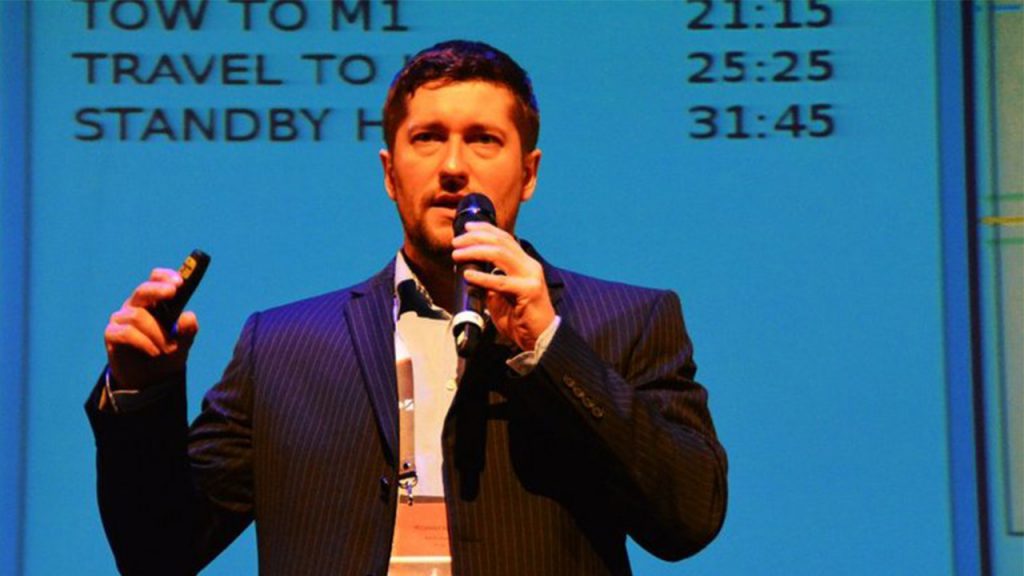Since 2014, Blue Dot Solutions has provided consulting services related to the space sector in Poland and Europe; integrated application projects related to GNSS and Earth Observation, together with hardware; and scientific communication realised under Kosmonauta.net.
The Polish space start-up was selected for the Disrupt Space Summit 2016 as one of twenty start-ups from the space sector, which have the potential to become disruptive to the market. Each had to present their achievements and plans at the summit in front of a jury of decision makers composed of several space agencies, including ESA and NASA, as well as investment groups and large companies from the space sector.
The decision makers selected Blue Dot Solutions as one of five finalists in the start-up competition. Their idea combines satellite navigation and ground sensors for operations at airports, and is currently at a prototype stage. Within the next months first tests should begin.
Spaceoneers caught up with Blue Dot Solutions’ CEO, Krzysztof Kanawka to find out how the company got started, what challenges it had to overcome and how they have got investors behind their ideas.
Spaceoneers: First, tell me a bit about Blue Dot Solutions.
Krzysztof: What we do, we want to do things better here down on Earth using satellite data. We come from different academic backgrounds using technology, using engineering and some social sciences – a kind of explosive mix that made it happen.
Spaceoneers: How did the idea for your business come about?
Krzysztof: A lot of us understood the space sector quite well; we were fascinated by the space sector for quite a long time. In 2009 we decided to start a website, just enough in our spare time to talk about what’s going on in the space sector, and provide at times some of our own point of view. Quickly it became quite serious. So, we started writing something more about economics, financing and other things that could be done in the space sector. And then it turned out, in our small niche; we were the only ones who did something [in this area]. And then we started saying: ‘maybe we could try something on our site on the business side. We’re still students, still doing PhDs and post-docs, so we can risk it. So, why not?’
Then [it went] from the first contract to another contract, and another contract, ESA contracts, investors finally and then some new ideas and new projects; some of a more commercial nature, some that are less commercial in nature and some more for environment, for example.
Spaceoneers: Who and what are your influences? Why?
Krzysztof: That’s a very good question. I wouldn’t go on a traditional way and find influences that are typical to everyone who’s being interviewed about the space sector. In general I’d say economics, industrialists who made quite a lot of achievements in previous decades that did a lot of nice things with their companies; they started nicely and then they started to fail, so why did they fail? For example, Howard Hughes is a very interesting example.
Also what happened with astronauts and what was their career after they landed on the Moon when they retired from NASA? Neil Armstrong and Buzz Aldrin, what has happened to them since? How did it influence their goals?
I would say it’s not the perfect thing to be influenced by someone. Sometimes you should really go on your own path.
Spaceoneers: How did you stay motivated to overcome these challenges?
Krzysztof: There’s more challenges than motivation, I’d say. The problem is sometimes that these projects are kind of a linear thing. Once you get inside you’re really excited in the beginning, and it’s really nice sometimes. Sooner or later or later you start having problems
If you’re in a group of people with different competences, you can keep your motivation by inspiring yourself and say to each other ‘you’re doing great work, so let’s continue’. This problem can be overcome if we work together.
Spaceoneers: How did you get investors behind your idea?
Krzysztof: The investors came later. First of all we had proven that what we do is sustainable on an economic level, which meant we started generating profits. Of course, it’s still not so much that we could work completely in our company but it started to be interesting. At the same time we started having good contacts in investor circles. That worked well. They could see we have PhDs and that we have competences on the technical level. “So why not invest in us?” And that’s how it happened.
Spaceoneers: What technologies and trends, do you think, will drive the biggest changes in your industry over the next two years?
Krzysztof: For sure, Galileo and GNSS, which is satellite navigation because they are being introduced. In a few years we will have several different satellite navigation constellations. All of them are offering some different level of quality of data. Also, other things but Galileo will be for civilian nature. We will have several unique features that will be quite interesting from the commercial perspective. And that’s what might be interesting to us. There are some reports say that in Europe over the next new years there will be over 100,000 places of work just related to satellite navigation and applications, so how to use satellite data in daily life on something that may be sometimes funny and it is utilising satellite navigation.
Spaceoneers: What important advice would you give to others who are interested in starting their own space start-up?
Krzysztof: Disrupt space, that’s my answer. Seriously, try to find people that who might be interesting and try to develop your idea. See if that idea does not already exist because usually it exists. Try to receive some feedback, some criticism and see what is going on. And then if something that isn’t working, try to transform it to something that might work. That transformation might be the most important part of developing your project because you learn much, much more than just sticking to one potential idea, which might be very difficult to achieve.
Spaceoneers: What makes you a spaceoneer?
Krzysztof: I, personally, don’t think I’m such a person. Simply, the space sector has developed so rapidly and so extensively, that now is the time for the commerce. So, I wouldn’t call myself a pioneer. I’m simply a regular businessman simply using more advanced data from satellites. It’s a different age.

